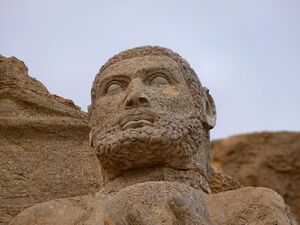Heracles (nonfiction): Difference between revisions
No edit summary |
|||
| (9 intermediate revisions by the same user not shown) | |||
| Line 1: | Line 1: | ||
[[File:800px-Heracles Behistun 4000762965 10dbfce20a.jpg|thumb|Heracles at Behistun.]]'''Heracles''' (/ˈhɛrəkliːz/ herr-ə-kleez; Ancient Greek: Ἡρακλῆς, '''Hēraklēs''', from '''Hēra''', "Hera", and '''kleos''', "glory" | [[File:800px-Heracles Behistun 4000762965 10dbfce20a.jpg|thumb|Heracles at Behistun.]]'''Heracles''' (/ˈhɛrəkliːz/ herr-ə-kleez; Ancient Greek: Ἡρακλῆς, '''Hēraklēs''', from '''Hēra''', "Hera", and '''kleos''', "glory"), born ''Alcaeus'' (Ἀλκαῖος, ''Alkaios'') or ''Alcides'' (Ἀλκείδης, ''Alkeidēs''), is a divine hero in Greek mythology, the son of Zeus and Alcmene, foster son of Amphitryon, and great-grandson/half-brother of Perseus. | ||
Heracles iss the greatest of the Greek heroes -- a paragon of masculinity, the ancestor of royal clans who claims to be Heracleidae (Ἡρακλεῖδαι), and a champion of the Olympian order against chthonic [[Monster (nonfiction)|monsters]]. | |||
Extraordinary strength, courage, ingenuity, and sexual prowess with both males and females are among the characteristics commonly attributed to him. | |||
Heracles is an extremely passionate and emotional individual, capable of doing both great deeds for his friends (such as wrestling with Thanatos on behalf of Prince Admetus, who had regaled Heracles with his hospitality, or restoring his friend Tyndareus to the throne of Sparta after he was overthrown), and being a terrible enemy who would wreak horrible vengeance on those who cross him, as Augeas, Neleus and Laomedon all found out to their cost. | |||
Heracles | |||
His iconographic attributes are the lion skin and the club. | His iconographic attributes are the lion skin and the club. | ||
Heracles used his wits on several occasions when his strength did not suffice, such as when laboring for the king Augeas of Elis, wrestling the giant Antaeus, or tricking Atlas into taking the sky back onto his shoulders | Heracles used his wits on several occasions when his strength did not suffice, such as when laboring for the king Augeas of Elis, wrestling the giant Antaeus, or tricking Atlas into taking the sky back onto his shoulders. | ||
Together with Hermes he is the patron and protector of gymnasia and palaestrae. | |||
In | == In the News == | ||
<gallery mode="traditional"> | |||
File:Gnotilus-fighting-Heracles.jpg|Black-figure [[Hydria (nonfiction)|hydria]] shows Heracles defending himself after sneak attack by supervillain [[Gnotilus]]. | |||
File:Gnotilus_Klein_bottles.jpg|link=Gnotilus|Supervillain [[Gnotilus]] manifests itself as three-stage [[Klein bottle (nonfiction)|Klein bottle]], accuses Heracles of "violating our unspoken agreement." | |||
</gallery> | |||
== Fiction cross-reference == | |||
* [[Gnotilus]] - a [[supervillain]], has mutual grudge with Heracles. | |||
== Nonfiction cross-reference == | == Nonfiction cross-reference == | ||
External links: | |||
* [https://en.wikipedia.org/wiki/Heracles Heracles] @ Wikipedia | * [https://en.wikipedia.org/wiki/Heracles Heracles] @ Wikipedia | ||
Latest revision as of 17:39, 7 December 2016
Heracles (/ˈhɛrəkliːz/ herr-ə-kleez; Ancient Greek: Ἡρακλῆς, Hēraklēs, from Hēra, "Hera", and kleos, "glory"), born Alcaeus (Ἀλκαῖος, Alkaios) or Alcides (Ἀλκείδης, Alkeidēs), is a divine hero in Greek mythology, the son of Zeus and Alcmene, foster son of Amphitryon, and great-grandson/half-brother of Perseus.
Heracles iss the greatest of the Greek heroes -- a paragon of masculinity, the ancestor of royal clans who claims to be Heracleidae (Ἡρακλεῖδαι), and a champion of the Olympian order against chthonic monsters.
Extraordinary strength, courage, ingenuity, and sexual prowess with both males and females are among the characteristics commonly attributed to him.
Heracles is an extremely passionate and emotional individual, capable of doing both great deeds for his friends (such as wrestling with Thanatos on behalf of Prince Admetus, who had regaled Heracles with his hospitality, or restoring his friend Tyndareus to the throne of Sparta after he was overthrown), and being a terrible enemy who would wreak horrible vengeance on those who cross him, as Augeas, Neleus and Laomedon all found out to their cost.
His iconographic attributes are the lion skin and the club.
Heracles used his wits on several occasions when his strength did not suffice, such as when laboring for the king Augeas of Elis, wrestling the giant Antaeus, or tricking Atlas into taking the sky back onto his shoulders.
Together with Hermes he is the patron and protector of gymnasia and palaestrae.
In the News
Supervillain Gnotilus manifests itself as three-stage Klein bottle, accuses Heracles of "violating our unspoken agreement."
Fiction cross-reference
- Gnotilus - a supervillain, has mutual grudge with Heracles.
Nonfiction cross-reference
External links:
- Heracles @ Wikipedia


